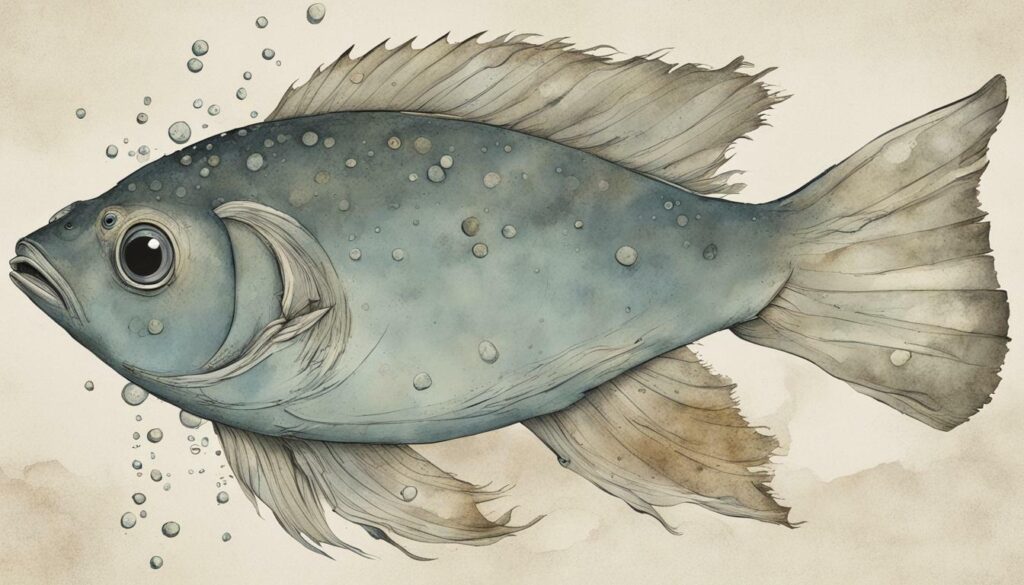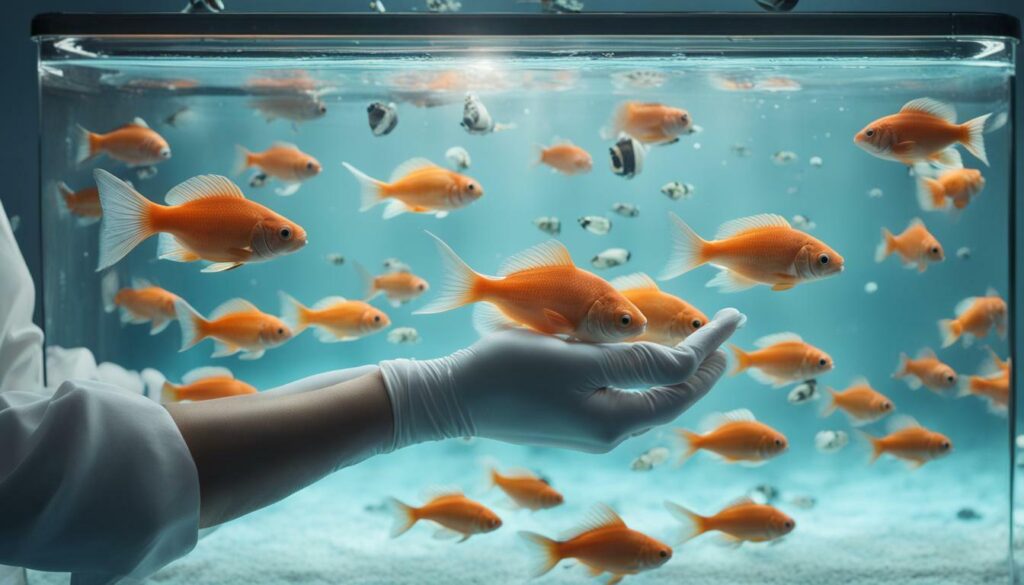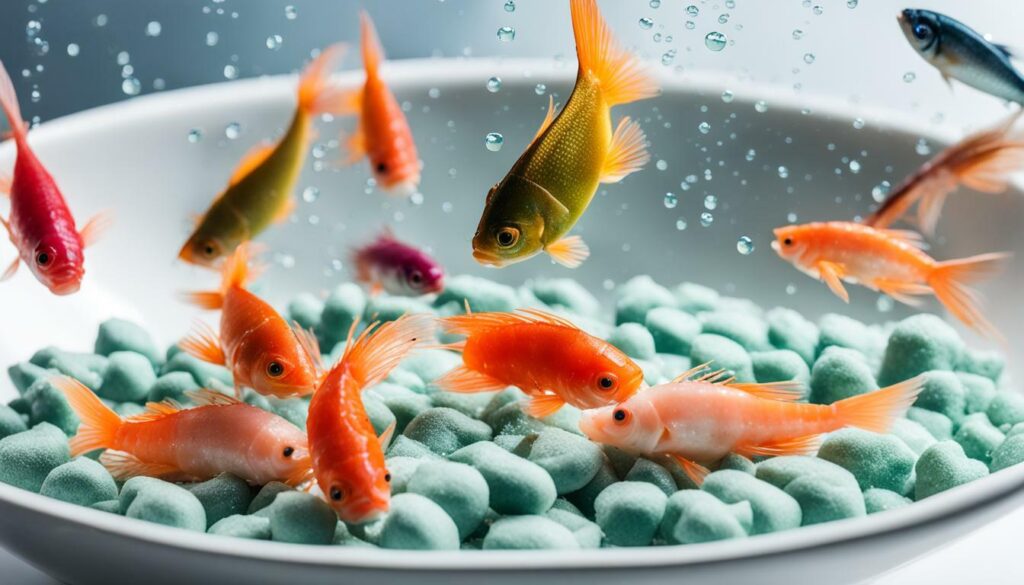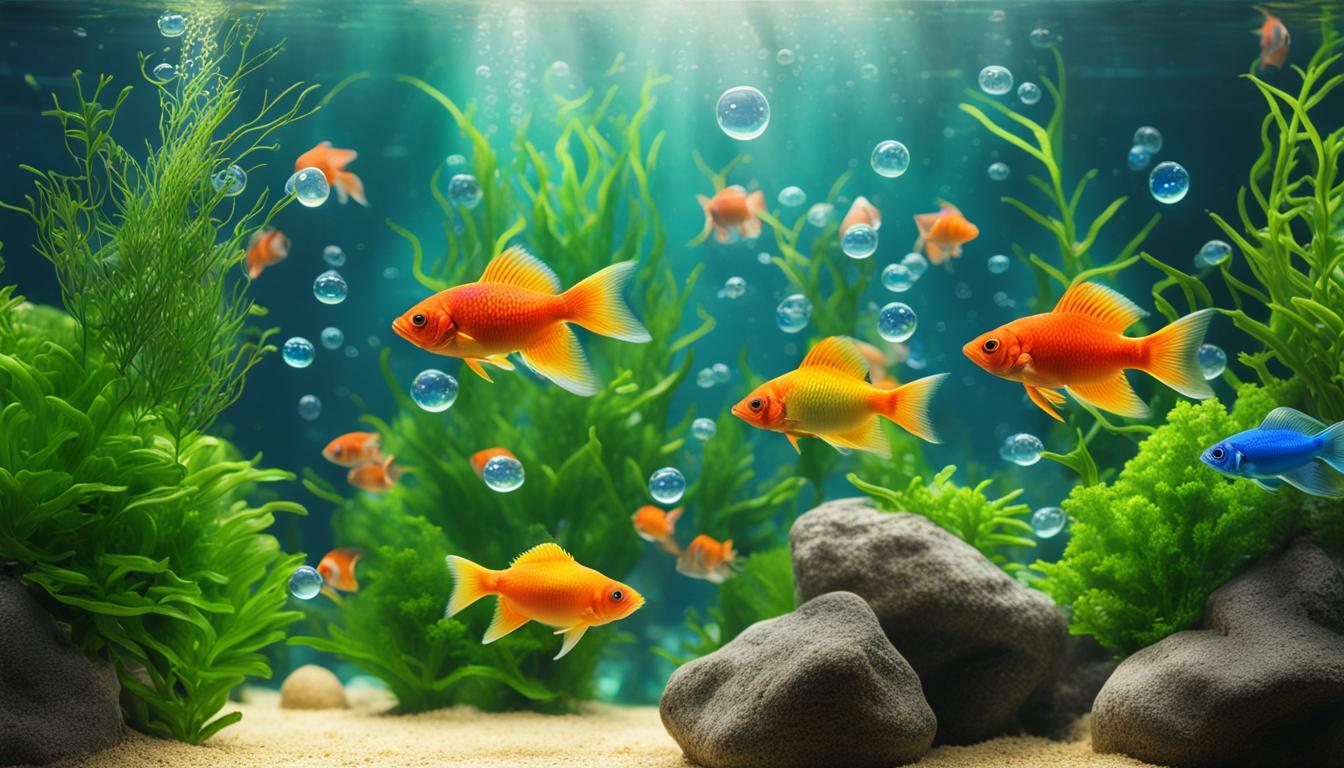Welcome to our article on aquarium fish viruses. As aquarium enthusiasts, we understand the value and joy that healthy fish bring to our lives. Unfortunately, fish viruses can quickly spread and have a detrimental impact on our fish’s overall health and well-being. It’s essential to take preventative measures and know how to identify and treat infections to maintain a thriving aquarium environment.
Key Takeaways
- Aquarium fish viruses can have a severe impact on fish health and should be prevented and treated promptly.
- Early detection and diagnosis are crucial in effectively treating fish viruses.
- A clean and well-maintained aquarium, proper nutrition, and minimizing stress factors can significantly contribute to fish health and disease resistance.
- Consulting a veterinarian who specializes in aquatic animals is recommended for proper diagnosis and treatment.
Understanding Aquarium Fish Viruses
At some point, any aquarium owner can face a fish virus outbreak, and understanding the basics of viral diseases in fish and their transmission can help identify and prevent issues before they become more severe.
Viral diseases in fish are caused by a variety of viruses that can affect different species of fish and their organs, including skin, gills, liver, kidneys, and the nervous system.
Common fish infections include viral hemorrhagic septicemia, infectious pancreatic necrosis, and lymphocystis.
Viruses can be transmitted through direct contact with an infected fish, contaminated water or substrate, or infected food. Because some viruses can survive for long periods outside their host, proper quarantine protocols are critical when introducing new fish into an aquarium.
Early detection is crucial for effective treatment, as some viral infections can spread quickly and cause a high mortality rate. Look for signs such as decreased appetite, lethargy, abnormal swimming behavior, or lesions.

While there are no specific cures for viral infections in fish, treatment options can help alleviate symptoms and potentially slow the progression of the disease. These treatments include supportive care, such as maintaining a healthy and stress-free environment, or antiviral medications, which may require a veterinarian’s prescription.
Understanding Aquarium Fish Viruses
It’s essential to understand the basics of fish viruses, including the various types of viral diseases that commonly affect aquarium fish.
Viral diseases in fish can impact the health of the whole aquarium, including causing problems with water quality, and can be difficult to diagnose and treat. Prevention is essential to avoid outbreaks and maintain a healthy environment.
Some common symptoms of viral infections include lethargy, decreased appetite, abnormal swimming behavior, or lesions.
While some viral infections can be treated with supportive care, such as maintaining a stress-free environment for the fish, others may require antiviral medications or other treatments that only a veterinarian can provide.
Preventing Fish Virus in Your Aquarium
Prevention is key when it comes to maintaining healthy aquarium fish. A strong fish immune system is the first line of defense against viral infections, so it’s important to provide your fish with a clean and stress-free environment to promote their overall health and disease resistance. Here are some practical tips to help prevent fish viruses in your aquarium:
| Prevention Tip | Description |
|---|---|
| Quarantine New Fish | Before introducing new fish to your aquarium, quarantine them in a separate tank for at least 2 weeks to ensure they are free from viruses and other diseases. This will prevent the spread of any potential infections to your existing fish. |
| Maintain Good Water Quality | Ensure that your aquarium’s water is well-filtered, adequately oxygenated, and free from harmful toxins and pollutants. Test your water regularly and perform routine water changes to maintain optimal water quality. |
| Keep a Clean Aquarium | Regularly clean your aquarium’s substrate, decorations, and filter media to reduce the buildup of organic waste and harmful bacteria. Use an aquarium-safe cleaning agent and avoid overfeeding your fish to prevent excess food from accumulating in the tank. |
| Reduce Stress Factors | Minimize potential stress factors in your aquarium, such as overstocking, poor water conditions, and aggressive tankmates. Provide your fish with ample hiding places, appropriate lighting, and a consistent feeding schedule to promote a low-stress environment. |
| Offer a Well-Balanced Diet | Feed your fish a diverse and nutritious diet that meets their specific dietary needs. High-quality fish food, fresh vegetables, and supplements can support a healthy immune system and boost disease resistance. |
Implementing these preventative measures can significantly reduce the risk of viral infections in your aquarium fish. By maintaining a clean and well-regulated environment, you can help ensure the long-term health and wellbeing of your aquatic pets.

Common Fish Infections: Symptoms and Causes
In this section, we will discuss some of the most common fish infections that can occur in aquariums. It is important to be aware of the signs and symptoms of these infections so that you can take appropriate action to prevent them in the future.
One of the most common fish infections is fin rot. This bacterial infection can be caused by poor water quality, overcrowding, or stress. Symptoms include frayed or decaying fins, as well as redness or inflammation around the edges of the fins. If left untreated, fin rot can lead to a serious bacterial infection and even death.
Another common infection is ich, which is caused by a protozoan parasite. It typically affects fish that are stressed or have weakened immune systems. Symptoms include small white spots on the skin, rapid breathing, and flashing (rubbing against objects). Ich can quickly spread throughout an aquarium, so it is important to quarantine infected fish immediately.
Mouth and body fungus are also common infections that can occur in aquariums. These fungal infections can be caused by poor water quality, injury, or stress. Symptoms include white or gray patches on the skin or mouth, as well as difficulty eating or breathing.
It is important to note that some infections can be more difficult to diagnose and treat without the help of a veterinarian. If you suspect that your fish may be infected, it is always a good idea to seek professional advice.

As with any health issue, prevention is key. Regular water changes and tank maintenance can go a long way in preventing infections. It is also important to avoid overcrowding your aquarium and to provide your fish with a healthy diet. In the next section, we will discuss some preventative measures that you can take to help keep your fish healthy and virus-free.
Early Detection and Diagnosis
As we mentioned earlier, early detection is key to effectively treating aquarium fish viruses. It’s important to monitor your fish closely for any signs of illness and act promptly if you suspect something isn’t right. Some common symptoms of fish viruses include:
- Loss of appetite
- Lethargy or reduced activity
- Abnormal swimming behavior
- Visible signs of illness, such as lesions, sores, or discoloration
- Respiratory distress
If you notice any of these symptoms in your fish, it’s important to seek veterinary care as soon as possible. A veterinarian who specializes in aquatic animals can diagnose the specific viral infection and provide guidance on the best course of treatment.
There are several diagnostic methods available for fish viruses, including blood tests, microscopic analysis, and even DNA testing. Your veterinarian may also recommend further testing, such as a biopsy or culture of the infected tissue, to confirm the diagnosis and determine the best treatment plan.
Remember, the earlier you seek veterinary care, the better chance your fish has for a successful recovery. Don’t wait until it’s too late to take action!

Treatment Options for Aquarium Fish Viruses
When it comes to treating aquarium fish viruses, there are several options available. The most appropriate treatment will depend on the type of virus and the severity of the infection.
Conventional treatments for fish viruses may include antibiotics, antifungal medications, or antiparasitic medications. These treatments are often administered orally or added to the aquarium water. However, it’s essential to note that antibiotics are not effective against viral infections since they only work on bacterial infections.
Alternative treatments for fish viruses may include herbal remedies, homeopathic treatments, or even acupuncture. These treatments may be less commonly used but have shown some success in treating certain viral infections in fish.
It’s important to note that not all treatments will work for all viruses or all fish species. Consulting a veterinarian who specializes in aquatic animals is essential for proper diagnosis and treatment.
Some fish viruses can be prevented by ensuring that the aquarium environment is clean and well-maintained, and the fish are healthy and stress-free. Stress factors can weaken a fish’s immune system and make them more susceptible to viral infections. Therefore, it’s essential to maintain good water quality, avoid overcrowding the tank, and provide a nutritious diet for your fish.

Conventional Treatment Options:
| Medication | Purpose |
|---|---|
| Antibiotics | Used to treat bacterial infections, not effective against viral infections. |
| Antifungal Medications | Used to treat fungal infections in fish. |
| Antiparasitic Medications | Used to treat parasitic infections in fish. |
Alternative Treatment Options:
- Herbal remedies
- Homeopathic treatments
- Acupuncture
It’s important to remember that alternative treatments may have limited scientific evidence to support their effectiveness and should only be considered after consulting with a veterinarian.
In conclusion, treating aquarium fish viruses depends on several factors, such as the type of virus, the severity of the infection, and the fish species. Consulting a veterinarian who specializes in aquatic animals is necessary for proper diagnosis and treatment. Additionally, maintaining a clean and healthy aquarium environment can prevent some fish viruses from occurring in the first place.
Quarantine Procedures for Infected Fish
In the unfortunate event that you suspect one of your aquarium fish may have contracted a virus, it is crucial to take immediate action to prevent the spread of infection to other fish in the aquarium. This means isolating the infected fish in a quarantine tank and providing the necessary treatment to prevent the illness from worsening.

The quarantine tank should be set up in a separate location from the main aquarium and should be equipped with its own filtration system, heater, and lighting. This will ensure that the infected fish can be closely monitored and treated without affecting the health of other fish in the main aquarium. Additionally, remember to thoroughly clean and disinfect any equipment or tools used during the quarantine process to prevent cross-contamination.
When setting up the quarantine tank, ensure that the water parameters are consistent with those of the main aquarium to minimize stress on the infected fish. Monitor the fish’s behavior, appetite, and overall health regularly, and seek veterinary care if necessary.
Remember, prevention is always better than cure, but in the case of an infection outbreak, prompt action is necessary to prevent the spread of illness to other fish. By taking the necessary steps to set up a quarantine tank and providing the correct treatment, you can help your infected fish recover and maintain a healthy aquarium environment for all your fish.
Maintaining a Clean Aquarium Environment
Keeping a clean and well-maintained aquarium is crucial to preventing fish viruses and promoting overall fish health. Here are some practical tips to help you maintain a healthy and disease-free aquarium environment:
| Tip | Description |
|---|---|
| Regular water changes | Regularly changing the water in your aquarium can help remove excess waste and debris that can lead to bacterial growth. A good rule of thumb is to change 10-15% of the water every week, depending on the size of your aquarium. |
| Proper filtration | Investing in a high-quality filtration system can help remove excess food, waste, and other harmful substances from the water. Be sure to clean and maintain the filter regularly to keep it functioning properly. |
| Remove uneaten food | Removing any uneaten food within a few minutes of feeding can help prevent the accumulation of waste and reduce the risk of viral infections. |
| Avoid overcrowding | Overcrowding can lead to an accumulation of waste and create stressful conditions for fish. Only keep fish that are compatible with each other and ensure that there is enough space for them to swim and thrive. |
| Quarantine new fish | Before adding new fish to your aquarium, be sure to quarantine them in a separate tank for at least two weeks to ensure that they are healthy and disease-free before introducing them to your main aquarium. |
By following these tips and maintaining a clean and healthy aquarium environment, you can help prevent the occurrence and spread of fish viruses and promote the overall health and well-being of your aquarium fish. Remember to always monitor your fish for any signs of illness and take prompt action if necessary.

Nutrition and Immune System Support
Ensuring your aquarium fish receive proper nutrition is crucial in maintaining a healthy immune system and preventing viral infections. A well-balanced diet that contains essential vitamins, minerals, and other nutrients can help enhance fish health and disease resistance.
When selecting fish food, look for high-quality options that are specifically designed for your fish species. We recommend avoiding overfeeding your fish, as excess food can lead to poor water quality and stress, weakening their immune system.
In addition to fish food, supplements such as vitamins and probiotics can also be beneficial in boosting the fish’s immune system. These supplements can help enhance the fish’s natural ability to fight off infections and support overall health.
Pro tip: Consider adding fresh or frozen foods, such as brine shrimp or bloodworms, to your fish’s diet on occasion, as they offer a rich source of essential nutrients that can vary from their standard diet.

Recognizing Stress Factors
Stress in aquarium fish can weaken their immune system, making them more susceptible to viral infections. Therefore, it is crucial to identify and eliminate stress factors for the well-being of your fish. Here are some common stressors to watch out for:
- Poor water quality
- Overcrowding
- Incompatible tank mates
- Inadequate diet
- Changes in water temperature and pH levels
- Loud noises or sudden movements near the aquarium
By understanding these stress factors, you can take steps to minimize their impact and create a low-stress environment for your fish. This includes maintaining excellent water quality, providing a suitable diet and ample swimming space, and avoiding sudden changes or disturbances.
In addition, it’s essential to observe your fish regularly and look out for any signs of stress, such as abnormal swimming behavior, loss of appetite, or color changes. By taking proactive measures to reduce stress factors, you can help your fish maintain a robust immune system and prevent the onset of fish viruses.

Consulting a Veterinarian
If you notice any concerning symptoms or suspect that your aquarium fish may have a viral infection, it is crucial to seek professional help from a veterinarian who specializes in aquatic animals.
A knowledgeable vet can provide proper diagnosis and treatment, as well as guidance on how to maintain a healthy and disease-free aquarium environment. They can also advise on preventative measures and offer recommendations on nutrition, stress management, and other factors that contribute to fish health.
Finding a qualified veterinarian may take some research, but it is worth the effort to ensure that your fish receive the best care possible. Ask for recommendations from fellow aquarium hobbyists, check online reviews, or contact your local pet store for referrals.
Remember, early detection and prompt treatment are essential in successfully combating aquarium fish viruses. Don’t hesitate to seek professional help if you suspect that your fish may be ill.

Image Description: An image of a colorful fish swimming in an aquarium.
Conclusion
We hope that this article has been informative and helpful in guiding you towards maintaining a healthy and thriving aquarium environment. Remember, prevention is key when it comes to keeping your fish virus-free. By maintaining a clean aquarium environment, monitoring stress factors, and providing proper nutrition, you can contribute to the overall health and well-being of your fish.
If you do notice any symptoms of fish diseases, early detection and prompt treatment are crucial in effectively treating aquarium fish viruses. By consulting a veterinarian who specializes in aquatic animals and setting up a separate quarantine tank, you can help prevent the spread of viruses within your aquarium.
Ultimately, the key to a successful aquarium is knowledge and dedication. By educating yourself on fish health and implementing the tips provided in this article, you are taking important steps towards ensuring a happy and healthy life for your aquarium fish.
FAQ
Q: How can I prevent fish viruses in my aquarium?
A: Preventing fish viruses requires maintaining a clean and disease-free aquarium environment. Regular water changes, proper filtration, and quarantine procedures for new fish are essential. It is also important to provide a balanced and nutritious diet to support fish immune systems.
Q: What are the symptoms of fish viral infections?
A: Symptoms of fish viral infections can vary depending on the specific virus. Common signs to watch out for include lethargy, loss of appetite, abnormal swimming patterns, skin discoloration, and fin deterioration. If you notice any of these symptoms, it is important to take action promptly.
Q: How can I diagnose fish viruses?
A: Diagnosing fish viruses typically requires the expertise of a veterinarian who specializes in aquatic animals. They may perform various diagnostic tests, such as blood tests or microscopic examination of infected tissues. If you suspect your fish has a viral infection, it is best to consult a professional for an accurate diagnosis.
Q: What treatment options are available for fish viruses?
A: Treatment options for fish viruses may include the use of antiviral medications, antibiotics (to treat secondary infections), and supportive care to boost the fish’s immune system. It is important to consult a veterinarian for guidance on the most appropriate treatment plan for your specific situation.
Q: How do I set up a quarantine tank?
A: A quarantine tank is a separate, isolated tank used to house new fish or fish showing signs of illness. It should have its own filtration system and be prepared with clean, conditioned water. The quarantine tank should be kept separate from the main aquarium to prevent the spread of diseases.
Q: Why is maintaining a clean aquarium important in preventing fish viruses?
A: A clean aquarium helps prevent the buildup of harmful bacteria and parasites that can weaken fish immune systems and make them more susceptible to viral infections. Regular cleaning routines, water quality management, and proper maintenance practices are crucial for maintaining a healthy environment for your fish.
Q: Is consulting a veterinarian necessary for fish virus treatment?
A: Consulting a veterinarian who specializes in aquatic animals is highly recommended for the proper diagnosis and treatment of fish viruses. They have the expertise and resources to accurately identify the virus and provide appropriate treatment options. If you suspect your fish has a viral infection, seek professional help as soon as possible.

